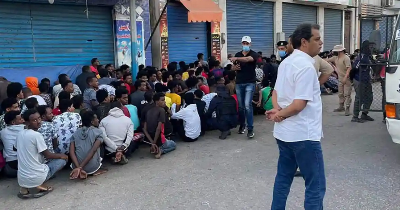Share
Human Rights Voices
While the UN devotes its human rights operations to the demonization of the democratic state of Israel above all others and condemns the United States more often than the vast majority of non-democracies around the world, the voices of real victims around the world must be heard.
Libya, October 8, 2021
Reports of physical and sexual violence as Libya arrests 5,000 migrants in a week
Original source
The Guardian
More than 5,000 refugees and migrants have been arrested by the Libyan authorities in the past week with some allegedly subjected to severe physical and sexual violence, before being held in increasingly “inhumane conditions” in detention centres in Tripoli.
Many of those arrested escaped wars or dictatorships across Africa, and have already undergone years of detention. They were intercepted at sea trying to reach Europe by the EU-supported Libyan coastguard.
The Libyan authorities have said that the arrests are linked to illegal immigration and drug trafficking.
Medical charity Médecins Sans Frontières (MSF) said the number of people in Tripoli’s detention centres has more than trebled since Monday. “During the raids on their homes, many of those captured were reportedly subjected to severe physical violence, including sexual violence,” the charity said in a statement. One young migrant was killed and at least five others sustained gunshot wounds, according to the UN.
“We are seeing security forces take extreme measures to arbitrarily detain more vulnerable people in inhumane conditions in severely overcrowded facilities,” said Ellen van der Velden, MSF’s operations manager for Libya. “Entire families of migrants and refugees living in Tripoli have been captured, handcuffed and transported to various detention centres. In the process, people have been hurt and even killed, families have been split up and their homes have been reduced to piles of rubble.”
MSF – which recently ended a three-month suspension on providing aid in detention centres in protest at the level of violence there – visited two sites where the new captives are being held: Shara Zawiya and Al-Mabani.
In Shara Zawiya, more than 550 women – some of whom were pregnant – children, and newborn babies were crammed into cells. About 120 inmates shared just one toilet.
In Al-Mabani, MSF said men were forced to stand due to overcrowding, while hundreds of women and children were held outside, without shade or shelter. Several people were unconscious and required urgent medical attention.
One Eritrean, who has escaped arrest, said he had managed to contact friends who had been detained. “There is no water, food, stuff for sleeping,” he said. “There were some who tried to escape but got caught and were beaten and those who made it were wounded. Others paid to be released but unfortunately they got caught in the streets and went back to prison again.
“More than 90% of all the migrants are arrested,” he added. “It’s like we are playing hide-and-seek with the police or other forces now.”
On Monday, the UN refugee agency (UNHCR) said it was suspending work at its Tripoli day centre until further notice, after hundreds of refugees and migrants gathered there seeking protection. The agency said the suspension was due to “escalating tensions involving violence and disruptive behaviour”. On Thursday, UNHCR said it was working to establish alternative communication channels with those who needed help.
Another Eritrean said he had been trying to get assistance from the UN all week. “What do they want us to do?” he told the Guardian on WhatsApp. “They catch us at sea, they catch us in our homes. What do they need us to be? What’s our fault in this life? They don’t think we are humans.”
More than 81,000 migrants have been intercepted at sea since 2017 and returned to Libya by the Libyan coastguard, who are trained and equipped by the EU and have also received assistance from UK armed forces.
On Monday, the first findings from an independent fact-finding mission commissioned by the UN’s Human Rights Council found that “murder, enslavement, torture, imprisonment, rape, persecution and other inhumane acts committed against migrants [in Libya] form part of a systematic and widespread attack directed at this population, in furtherance of a state policy” which may amount to crimes against humanity.
Inside detention centres, the report said, “all migrants – men and women, boys and girls – are kept in harsh conditions, some of whom die. Some children are held with adults, placing them at high risk of abuse. Torture (such as electric shocks) and sexual violence (including rape and forced prostitution) are prevalent.”
The EU delegation to Libya did not respond to a request for comment.
The UN-backed Government of National Unity (GNU), led by Abdelhamid Dbeibah, came into power in Libya in March, as part of a peace process. Elections are scheduled to take place in December and January.

